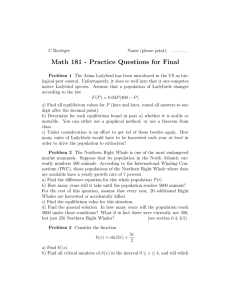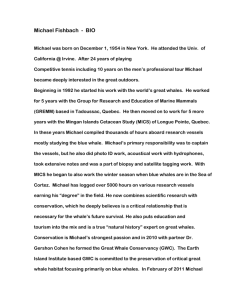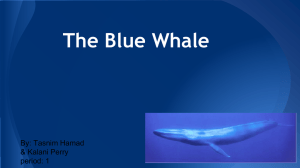Econ 522 Economics of Law Dan Quint Fall 2007
advertisement
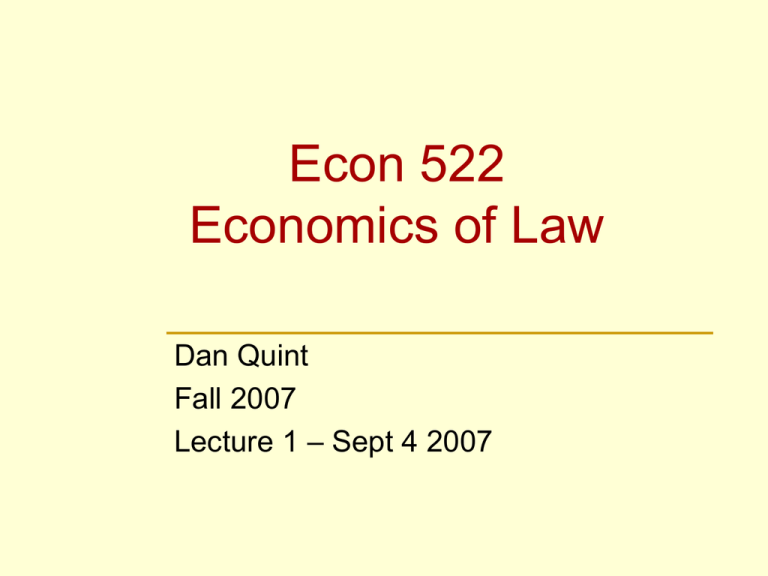
Econ 522 Economics of Law Dan Quint Fall 2007 Lecture 1 – Sept 4 2007 I’m Dan Quint, welcome to Econ 522 Lectures No class next Thursday (Rosh Hashanah) Class Website http://www.ssc.wisc.edu/~dquint/econ522 Syllabus online, with links to additional readings Office hours Mondays 10-11, Wednesdays 11-12 If you can’t make these and need to talk to me, email me at dquint@ssc.wisc.edu for an appointment Grading 2-3 problem sets (20%), midterm (30%), final exam (50%) Registration/waiting list 1 Readings Textbook Robert Cooter and Thomas Ulen, “Law and Economics” (fifth edition) Website: www.cooter-ulen.com has supplemental material Other readings A. Mitchell Polinsky, “An Introduction to Law and Economics” Papers listed on syllabus Most are available online I’ll try to highlight the most interesting/relevant 2 Outline of the Course 1. Overview/Introduction • • • 2. What is Law and Economics? Efficiency Common Law and Civil Law traditions Review of Relevant Microeconomics • • • • Price-Taking Behavior: Consumers, Producers General Equilibrium, Efficiency Uncertainty, Insurance Game Theory 3 Outline of the Course 3. Property Law • • • What constitutes private property? What can I do (what can’t I do) with my private property? Coase. Many externalities are caused by insufficiently defined property rights • • • • If a factory pollutes “too much,” it’s because nobody owns the rights to that air If those rights were defined and could be bought and sold, the free market would allocate them efficiently, solving the problem However, many reasons the Coase Theorem may not hold, we’ll discuss arguments on both sides Intellectual property 4 Outline of the Course 4. Contract Law • • • Major topic: what is the default rule for circumstances which are not specified in a contract? Typical contract: “In exchange for $30,000, I agree to deliver 16 tons of steel to this address on this date.” Now I fail to deliver. Do I just give back your $30,000? What if you incur losses from not having the steel – do I pay those? What if those losses are unusually large, due to circumstances you knew about but didn’t tell me? Some things are not contractible. If I give you money for drugs and you don’t supply them, I can’t sue you for breach of contract, because the contract was illegal. I also can’t contract to pay for sex, or to sell one of my kidneys. Why not? 5 Outline of the Course 5. Tort Law • • • • Who is responsible for accidents, and what type of damages do they owe? One theory: allocate responsibility to the “low-cost avoider” It might be very expensive for parents to test for lead paint in each toy they buy their children; cheaper for the factory to test them all at once. If the factory is liable, they have an incentive to provide safer toys Under some situations, it may not matter who is liable, since the market may be able to reallocate liability 6 Outline of the Course 6. Legal System • • 7. Crime and Punishment • • • 8. What is the process for getting remedy if I have been wronged? What makes a legal system more or less costly? More or less efficient? Do harsher punishments deter crime? Does a higher probability of being caught? Death penalty “Three strikes” laws Other Topics (time permitting) 7 Any questions? (Please let me know if I’m going too fast) 8 What is Law and Economics? 9 Initial answer: “Looking at the law like an economist” Microeconomics is the study of how parties respond to incentives Parties: consumers, firms, workers, governments Incentives: prices (explicit or implicit) Laws Expectations about rewards/consequences of actions Incentives to behave a certain way Changes in behavior Changes in outcomes 10 How does this differ from looking at the law in other ways? Lawyers generally see a case after the “damage is done” Someone has rear-ended your car Trucking company has failed to deliver 16 tons of steel to a factory Someone has been murdered Usually, what’s left is to assign blame and, if appropriate, choose a legal remedy No value is created or destroyed at this stage (usually) – just transferred from one party to another Very interesting to those two parties, and their lawyers Not so interesting to economists 11 On the other hand, When a new law (or a precedent) (or a legal system) is established, it changes expectations about what will happen in future situations, and therefore changes behavior A stricter liability rule might lead people to drive more carefully, or drive less, or not drive after three beers A rule on breach of contract might cause the trucking company to behave differently, or take on fewer commitments, or sign a different agreement in the first place A harsher penalty for murder might deter criminals, or it might lead them to go to more extreme lengths to avoid being caught Changes to behavior affect what outcomes are reached – what society as a whole creates, destroys, and consumes – and is therefore very interesting to economists 12 Laws, legal precedents, legal system Expectations/incentives Actions are taken Outcomes are realized Litigation occurs Damages paid 13 Of course, other steps are outside our realm Society organizes itself (constitution) Governmental/legal system determines process Legislators elected, judges appointed or elected Legislators enact laws, judges rule (legislators and judges respond to incentives) Laws, legal precedents 14 Efficiency 15 For the most part, we’ll be judging laws and legal systems on basis of efficiency Not Pareto-efficiency, but a more intuitive notion Efficiency – the total value of what society creates and consumes Ellickson: “Minimizing the objective sum of (1) transaction costs, and (2) deadweight losses arising from failures to exploit potential gains from trade” Posner: “wealth-maximizing” Simplest way to think of it: efficiency is maximizing the overall size of the pie, without regard for how it is divided up 16 Efficiency may conflict with other notions of “good” outcomes A law can be efficient but very unequal Laws favoring businesses over consumers, or rich over poor, may turn out to be efficient, but may not be morally desirable A law can be efficient but violate our intuitive notions of fairness 2005 Supreme Court case: Kelo vs City of New London City of New London, CT wanted private firm to launch a redevelopment plan for a neighborhood (hotel/conf center, state park, apartments, office, retail space) Several homeowners refused to sell their land to the developer City invoked eminent domain – right to seize private property for public use – and forced them to sell Supreme Court ruled for city Using scarce resource for more valuable purpose – likely efficient, 17 but may go against what we think of as fair However, there are several arguments why efficiency is the right focus If resources can be freely transferred between individuals, first maximize total size of pie, then worry about how to distribute it But what if resources are costly to transfer, or can’t be transferred, or won’t? Posner: hypothetical “ex-ante consent” Imagine everyone gets together beforehand, not knowing whether they’ll be the victim or the injurer in a traffic accident If everyone agrees that one liability system is cheaper to implement (more efficient) than another, everyone would agree to accept that system and live with the consequences So now imagine they did 18 However, there are several arguments for why efficiency is the right focus Another common argument: if you do want to redistribute resources, the tax system will generally do it better than the legal system So design the legal system to be efficient, then achieve any redistributive goals through taxes Cooter and Ulen give four arguments why taxes work better than “private laws” for redistribution (see textbook): More precisely targets “rich” and “poor,” while laws would target groups that were imperfect correlated with wealth, like “investors” and “consumers” Effects of changes in legal system harder to predict Higher transaction fees – lawyers’ contingency fees very high Redistribution via property law would cause larger distortions than 19 broad-based taxes My own feeling: economists are better at economics than philosophy I’ll tend to focus on positive statements – what effect we expect a law or policy to have… …rather than normative statements – what laws or policies should aim to achieve 20 One more note on efficiency Basic utility theory: can’t make utility comparisons across individuals To measure efficiency, we need to put everything into a common unit – money So we equate the value someone gets from something with their willingness to pay for it Posner, “Economic Analysis of Law,” points out the following (somewhat disturbing) dilemma: 21 One more note on efficiency “Suppose that pituitary extract is in very short supply… and is therefore very expensive. A poor family has a child who will be a dwarf if he doesn’t get some of the extract, but the family cannot afford the price [or borrow the money]. A rich family has a child who will grow to normal height, but the extract will add a few inches more, and his parents decide to buy it for him. In the sense of value used in this book, the pituitary extract is more valuable to the rich family… because value is measured by willingness to pay; but the extract would confer greater happiness in the hands of the poor family.” Efficiency is not the same as maximizing happiness… 22 The Common Law and Civil Law Traditions 23 Two major legal traditions emerged from Europe, spread throughout much of the world Common Law tradition – originated in medieval England, is still the basis for legal systems in many Englishspeaking countries Great Britain and Ireland U.S. and Canada Australia and New Zealand Parts of Africa and Asia Civil Law tradition – originated following French Revolution with the Napoleonic Code Persists in most of Western Europe, Central and South America, parts of Asia not colonized by Britain 24 Common Law is the grounding for U.S. law New laws enacted by legislature; judges interpret laws, but also rely heavily on precedent One version of the story: the English king’s courts were told to examine life and “find” law as it was already being practiced “Common law” grounded in social norms and practices – how people were behaving in the absence of well-defined laws Once a court ruled on one case, this established a precedent that other courts would generally follow when ruling on related cases Common law is thus rooted in common practices, except 25 where it’s been replaced by legislation Civil Law tradition started very differently At the time of the French Revolution, revolutionaries felt the judges, like the king, were corrupt and worthless Chose to abandon the common law and start fresh Napoleon commissioned a group of legal scholars to draft a new set of laws, the Napoleonic Code These scholars modeled their work on “The Body of the Civil Law,” compiled in sixth century A.D. for Roman emperor Justinian 26 So… The French system which became the Civil Law was based on “ancient sources and pure reason;” Common Law based on existing practices of people By enacting complete set of laws from a clean slate, Civil Law shares more with legal systems based on religion Under Civil Law, arguments appeal directly to the meaning of the law itself, and to commentary on the law which has tried to clarify this meaning Under Common Law, arguments often focus on legal precedents, and why particulars of past cases make them more or less relevant to the matter at hand 27 Whaling 28 “A Hypothesis of Wealth-Maximizing Norms: Evidence From The Whaling Industry” Robert Ellickson (1989) gives a nice example of how the Common Law is responsive to existing social norms… …which in turn are responsive to the economics of the particular situation, and therefore likely to be efficient He looks at 12 Anglo-American court rulings (mostly from 1800s) where ownership of a dead whale was contested In every case, judges ruled in accordance with whaling industry’s established norms... …and these norms varied across different locations, consistent with which rule was more efficient in different situations 29 “Fast Fish/Loose Fish” British whalers in the Greenland fishery established the “fast fish/loose fish” rule (quoted in Moby Dick) Prey were right whales – relatively slow and docile Hunting was done with a harpoon attached to the boat by a rope While the harpoon was in the whale and attached to the boat, the whale was a “fast fish” and belonged to the boat But if the whale was not yet harpooned, or broke free, it was a “loose fish” and other ships were free to go after it “Fast fish/loose fish” is a very simple rule, and therefore cheap to implement; and in this context, gave sufficient incentives to hunt whales 30 “Iron Holds the Whale” Sperm whales swim faster, dive deeper, and fight harder than right whales, and swim in schools Hunting them with a harpoon tied to the boat might sink the boat; hunting was done with harpoons connected to “drogues,” then the ship would follow the whale till it got tired When a ship stumbled into a school, more important to kill or wound as many as possible quickly rather than pausing to secure the first ones In fisheries where sperm whales dominated, norms developed that “iron holds the whale” The first to sink a harpoon into a whale owned it… …provided they remained in “fresh pursuit” “Fast fish/loose fish” vs. “Iron holds the whale” 31 Finback whales and split ownership Finback whales are extremely fast swimmers Nineteenth century whalers hunted them with “bomb lances” Dead whales would sink to the bottom immediately, wash up on shore some days later Need to provide incentives to hunt them, but also incentives for someone to harvest the whale upon finding it New England coastal norm was to split the whale roughly according to the effort of each (in other places, there was a predefined ratio) Ghen v Rich decision specifically pointed out that if finder were entitled to the whole whale, whaling industry would shut down 32 To sum up… In each context, norms appeared which provided sufficient incentives for valuable work (Incentives may have worked too well – when these norms appeared, whales were plentiful and valuable; but in many cases, whales were hunted to near extinction) And in each context, judges deferred to local custom when making their rulings 33
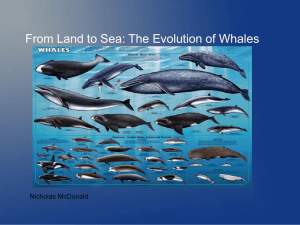
![Blue and fin whale populations [MM 2.4.1] Ecologists use the](http://s3.studylib.net/store/data/008646945_1-b8cb28bdd3491236d14c964cfafa113a-300x300.png)
